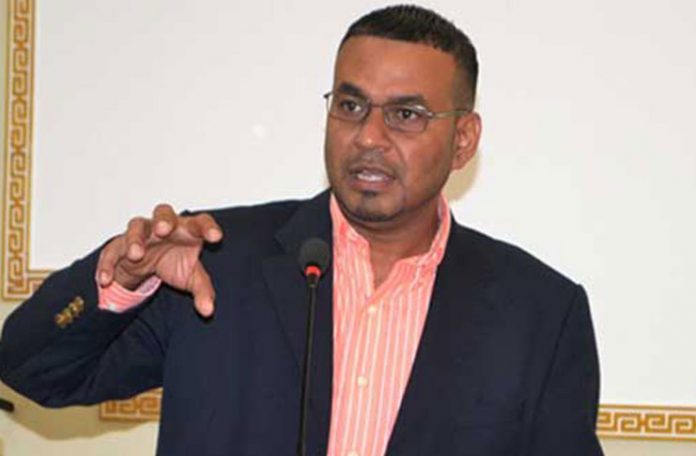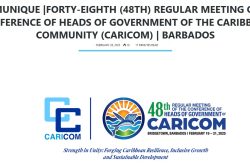Facing growing questions about his role in the awards of oil exploration blocks in the waning days of the PPP/C administration in 2015, former Minister of Natural Resources Robert Persaud yesterday said he has nothing to hide but remained tightlipped on the rationale behind his advice to grant the prime offshore acreage to two unproven companies.
Breaking his long-held silence on the matter, Persaud said that actions taken by the PPP/C administration to lay the foundation for Guyana to become an oil-producing nation were in “full conformity” with laws. His comments came in the form of a post on his Facebook page and followed a Sunday Stabroek article yesterday which reported that he is seen as a key figure in a State Assets Recovery Agency (SARA) probe on the award of the exploration blocks.
“I have not been contacted by SARA or any other entity regarding the issue of ‘oil blocks.’ I do support any independent, non-partisan review of the previous and current governments award of petroleum exploration licenses in Guyana’s offshore,” said Persaud yesterday in the Facebook post.
“We have nothing to hide and I do concur with former President Donald Ramotar, who as the then Minister with responsibility for Petroleum, earlier comment on this matter: ‘Any unbiased, professional independent review will once more confirm all due legal processes were followed and during the PPP/C time in office the country’s best interest was served, given the realities of the day’,” he added.
Persaud, who was involved in several controversial deals during his tenure as minister including granting permission to a Brazilian company to carry out mineral surveys in a strategic location close to the border, did not address his role in the awards of the oil exploration blocks even as he mentioned, what he described as the PPP/C’s “stellar and transparent” record.
“The PPP/C’s achievements and unwavering determination in laying the foundations for Guyana to be an oil producing nation has been both stellar and transparent as well as in full conformity with all relevant laws and regulations,” he said.
The Sunday Stabroek had reported that with SARA embarking on a probe of how two small companies without the capacity to drill for oil were able to lock down prime offshore acreage near to ExxonMobil’s key oil find days before the 2015 general elections, the spotlight will likely be on Persaud, the key decision maker in the awards of the petroleum prospecting licences for the blocks.
Since last year, Stabroek News has been reaching out to Persaud but to no avail. He has not returned calls, emails or messages. Recently, former President Ramotar, reiterated previous comments to Stabroek News that he believes that Persaud should address the issue and urged this newspaper to contact him.
When Stabroek News reached out again, Persaud’s response was, “Will make contact upon my return.” He did not specify when he will be returning to Guyana. Persaud, yesterday, limited his comments to his Facebook post.
Lucrative
More than a year ago, on March 25th, 2018, the Sunday Stabroek reported on the concerns about JHI and Mid-Atlantic Oil and Gas Inc (MOGI) gaining access to the Canje block and later farming in big players like French oil major, Total in what would be lucrative deals. Another company, Ratio also secured a deal.
While the APNU+AFC government had taken a hands off approach on these deals, SARA has begun to turn the heat up by announcing an investigation of the awards to the two companies based on whistleblower information.
Such has been the publicity and interest surrounding the probe that JHI and MOGI have taken out whole page advertisements in the daily newspapers to defend the deals.
Prior to yesterday’s Facebook post, Persaud did not answer Stabroek News’ questions and yesterday he claimed that he did not know that the questions sent to him solicited a formal response. He also took to his Instagram account yesterday, accusing this newspaper of irresponsible journalism.
“It’s troubling a reporter sends you a question in the middle of a private function where I have limited data coverage, but converts my response that I will get back to her into a misleading front page headline. Hatchet job or an attempt to arrest its declining sales by joining the tabloid masquerade? Either way it betrays responsible journalism,” he wrote, even as he juxtaposed a screen-grab of the question sent by the reporter and the newspaper headline.
Stabroek News Editor-in-Chief Anand Persaud said that the reporter’s use of the response by Persaud was perfectly in order.
Meantime, in his Facebook post, Persaud claimed that since the change of government in 2015, he has made himself available to answer questions.
“From the time of the current government’s assumption of office I have always made myself available for clarification and/or elaboration on policy decisions and actions taken in relation to my ministerial portfolios,” Persaud wrote.
“However, I will not be dragged into what is patently an elections propaganda campaign issue by a politically-controlled state agency and being promoted by sections of the media and so-called oil and gas ‘experts’ and ‘advisors’ one of whom to my knowledge was until recently one of the applicants for the award of an exploration block as part of a local business group”,” he said.
“I wish to caution against reckless and presumptive statements by vested interests as these can further undermine investors’ confidence and even encroach on sanctity of contracts and agreements with local and foreign investors,” he added.
By their own admission, in the currently running advertisements, JHI and MOGI say that negotiations for the Canje block began in March 2013. This was the exact period in which ExxonMobil was beginning preparations to finally begin a drilling programme in the Stabroek Block, where in May 2015, it made a major find.
With a general election just days away, Ramotar signed off on deals that he said were presented by Persaud. The big question has always been why in a transition period between administrations would such a major deal be concluded – and in secrecy – and why it couldn’t wait until after the general elections.
Observers say that in a farming-in arrangement for the Canje block, JHI and MOGI stand to make extraordinary gains from just having the licence and without the ability to drill for oil. JHI and MOGI have as their principals John Cullen and Edris Dookie, respectively, both of whom had a long association with Canadian oil company CGX, which had been pursuing the drilling of oil wells here since 2000. Observers say that both Cullen and Dookie might have over time become aware that Exxon’s ability to accurately pinpoint wells could lead to major discoveries.
For JHI, MOGI and Ratio, there would clearly be interest in locking down areas like Canje and all that had to be paid for a licence was US$2,000 or $400,000. For this pittance, a farmed-in major like Total could purchase a large block for a significant payout either upfront or once oil was found. No information has been made public on the financial relationship between the small companies and their partners although it is expected that the Guyana-Extractive Industries Transparency Initiative (GY-EITI) should present such information to the public.
Observers say what Ramotar and Persaud would have to explain is what policy led to a PPP/C government decision to license these small companies, the financial considerations involved and whether it should have been clear to all that such licensing should be to major companies.
Ramotar said that while the contracts for the two blocks would have been formally agreed to days before the 2015 General Elections, the investors – Dookie, a Guyanese, and Cullen, a Canadian – pursued investing in Guyana years before and at a time when there were no oil interests and this country was “begging” investors to come. Another agreement between the Government of Guyana and Ratio Energy Limited and Ratio Guyana Limited (now Cataleya Energy Limited), the former incorporated in Gibraltar and latter in Guyana, was signed on April 28th, 2015, only two weeks shy of the elections. Ratio had changed its name to Cataleya Energy Limited, by way of a duly registered change. Ramotar maintains that the companies did nothing illegal in their later farming out of their blocks as it is normal in the industry and stressed that as far as he knows, there was no insider information given to the companies because they signed at a time when there was no oil found.
However, questions have been raised about government not knowing about an oil find given that Persaud had two days after JHI registered as a company, announced in an interview that hydrocarbons were found by ExxonMobil. His ministry at the time had put out a statement on May 6th informing that ExxonMobil’s subsidiary, Esso Exploration & Production Guyana Limited (EEPGL) had found hydrocarbons but that it was too early to know if it was in commercial amounts.
And in the case of Ratio, its contract was signed one month after EEPGL had begun drilling in the offshore Stabroek Block. Exxon’s Deepwater Champion vessel was reported on the way to begin drilling on March 2nd of 2015 but the company had made a decision to mobilise for works here since September of 2013. ExxonMobil now has a 50% stake agreement with Ratio Guyana and the parent company Ratio Energy Limited. There is no information on the terms of the 50% stake.
Ratio’s principals have not spoken. Ryan Perreira is the Guyana representative for Ratio which has an interest in the Kaieteur Block. However, the company’s Ethan Eisenberg had last year said that the company had interests since 2013, although he did not specify when in 2013. Again, that would have been when ExxonMobil had begun to mobilise for its May, 2015 drilling. Eisenberg said that discussions were halted when a vessel working for US oil company, Anadarko was seized by the Venezuelan navy, in the same year.
Checks at the Commercial Registry showed that MOGI last filed annual returns in 2017 while JHI last filed in 2015.










